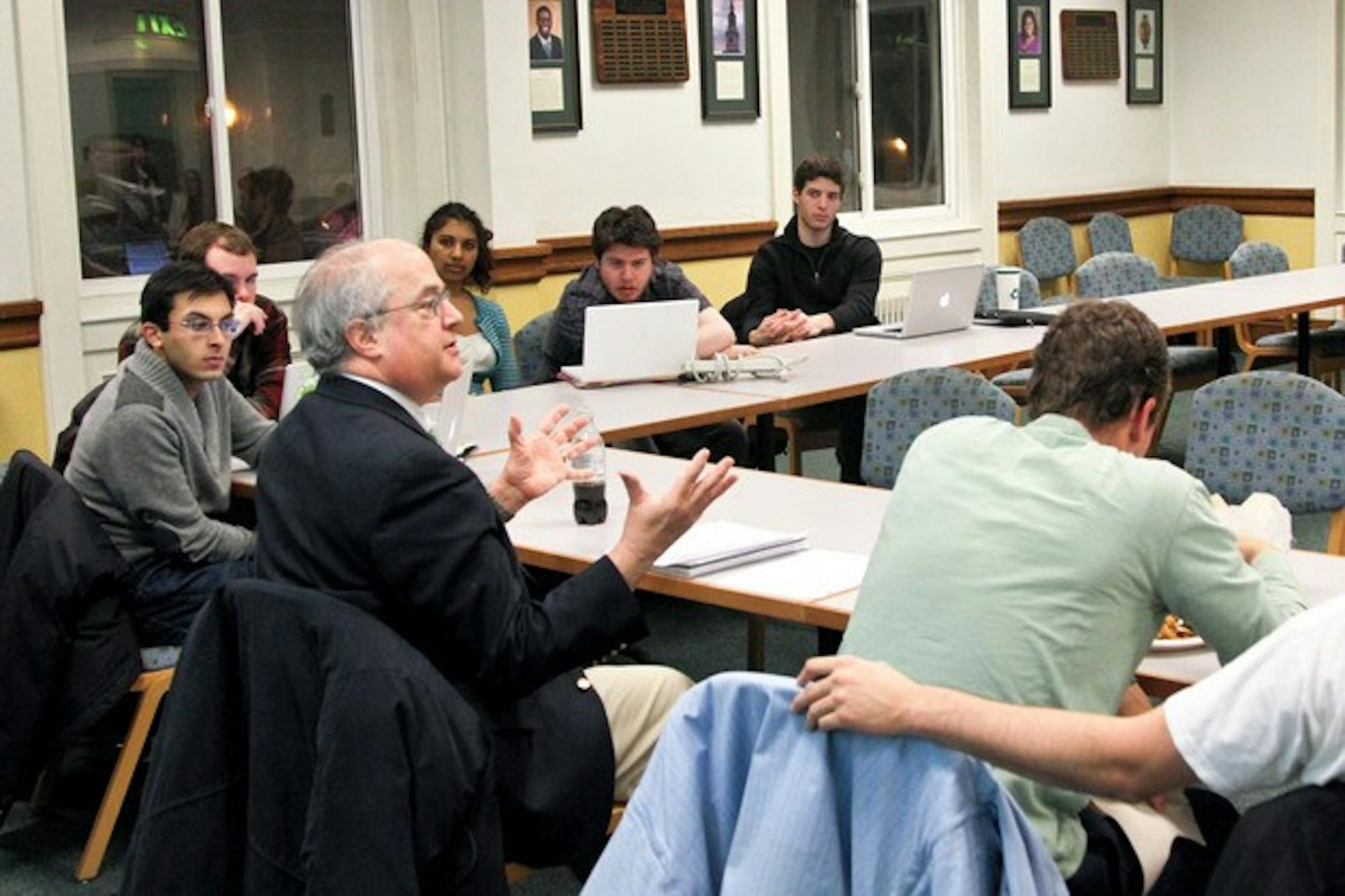After the organizers of the new Green Team bystander intervention program an initiative intended to reduce alcohol harm on campus announced the program at the General Assmbly meeting on Feb. 1, Greek organization leaders expressed strong support for the new student-run system. The Green Team organizers, who will host an information session Monday evening, will pilot the program at campus parties and events this term.
Max Yoeli '12, former student co-chair of the Student and Presidential Alcohol Harm Reduction Committee and former Kappa Kappa Kappa fraternity social chair, said the program is promising for the College and will allow students to demonstrate responsibility for one another's behavior.
Interfraternity Council President Tyler Brace '11 said he hopes to inform students about the merits of the program in the upcoming weeks.
"We hope that [students] will be interested and then find out more about [Green Team]," he said.
The new program will begin the weekend following Winter Carnival because organizers anticipate less activity on campus during those evenings, according to Akrami.
"We wanted to institute the program during a weekend where we weren't facing an enormous amount of large parties," Akrami said.
An eight-person Green Team committee will run the new program, and will be selected by Student Assembly Alcohol Crime and Reduction Committee co-chair Cyrus Akrami '11 and fellow committee members Jeff Millman Tu'12 and Charlotte Cipparone '12, Akrami wrote in an e-mail to The Dartmouth.
Cipparone will serve as the first head of the Green Team committee, according to Akrami. Millman created the Quaker Bouncer program an initiative that allows students to act as sober monitors at college parties at Haverford College which serves as the model for the Green Team program.
The committee will include representatives from multiple student groups on campus, according to Akrami.
"[The Green Team program] is almost completely student-run, and we would like to maintain that quality," he said.
Compared to previous alcohol-harm reduction initiatives, Green Team will be easier to integrate into campus culture because it is a student-operated program, according to Yoeli. As a former fraternity social chair, he said he would be less open to the idea of a program run by administrators.
"The only solution that students will like is one from other students," Yoeli said.
Panhellenic Council President Anna Sonstegard '11 emphasized the ability of students to affect campus culture and address unsafe behaviors.
"I think that because it's student-run it's going to be most effective in reducing high-risk drinking," she said.
Though not a primary focus of the program, Green Team will "hopefully" reduce sexual assault on campus, Akrami said. Green Team members will receive training in sexual assault response.
Brace said Green Team members would not be ostracized by Greek organizations. In most cases, one of the four Green Team members monitoring a party will likely be a member of the organization hosting the event, Akrami said.
"The goal is to have as many [Green Team members] affiliated as possible," Brace said.
All members of the junior and senior classes can apply to be Green Team members. Green Team services will be available to all students and organizations that wish to ensure safety at a social event of any size, and students can request a Green Team in advance of their planned event via e-mail, The Dartmouth previously reported.
Students are in a better position than administrators to respond to alcohol-related problems, according to Blaine Johnson '13, a member of Sigma Delta sorority. When administrators try to address such issues, the result "doesn't seem to work as well," she said.
Brace said the Green Team's approach will reduce harm and promote safety more effectively than Safety and Security walkthroughs, but declined to comment further on his reasoning.
"We hope in the near future Green Team serves as a template for eliminating Tier 2 walkthroughs," Brace said.
The revised Social Event Management Procedures define Tier 2 events as gatherings of 150 people or fewer, or events which at least one non-member attends, making such gatherings eligible for Safety and Security walkthroughs.
When assigned to Greek house events, Green Team members will be able to distribute wrist bands and check IDs tasks usually reserved for members of the Greek organization for the duration of the event, The Dartmouth previously reported.
Greek organizations will be able to determine how much power to grant Green Team members at parties, Akrami said.
"The program is meant to be as non-intrusive as possible," he said.
Sonstegard said it "makes sense" for Green Team members to enjoy member status while they are assisting with an organization's "internal management procedures."
"They're just helping the house it's not stepping on anyone's toes," she said. "I think it's a great student-led initiative to address high-risk drinking on our campus."
Several students interviewed by The Dartmouth said they would be receptive to Green Team's presence at social events.
"As a member of a sorority, I think it's great that you can outsource," Johnson said.
Other students interviewed said they do not have enough information to draw conclusions about the program at this time.
Although plans have not been finalized, the Green Team committee will evaluate the program's success in reducing student hospitalizations periodically after the program is implemented, Akrami said. Greek organizations will be asked to provide the committee with feedback after each event, according to Akrami.
"We will be looking for feedback from Greek houses who use the program and change as necessary," he said.
The Green Team committee will host an information session for students interested in working as sober monitors in Collis 101 on Monday, according to a campus-wide e-mail sent by Student Body President Eric Tanner '11.
Staff writer Daniel Bornstein contributed to the reporting of this article.




